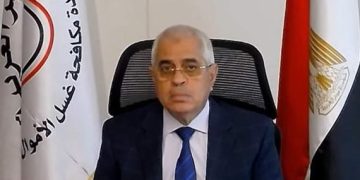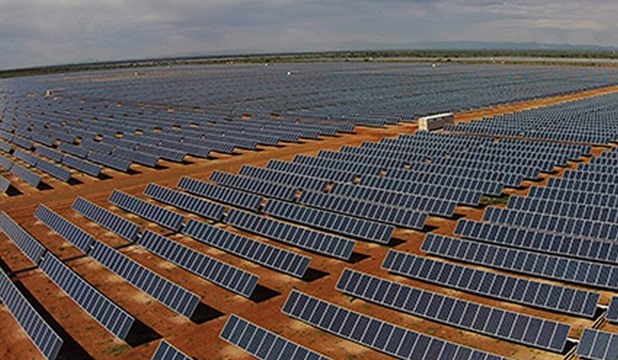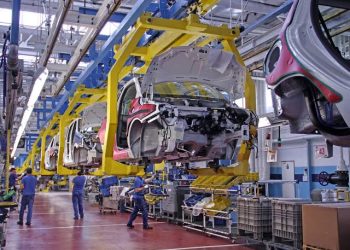Solar energy from the Egyptian desert could power homes in the UK, the British Daily Telegraph newspaper reported on 22 September.
An undersea cable would connect Egypt and Europe to transport electricity from North African solar farms and wind turbines to Britain and Europe. Exported energy will be supplied in times of low winds or poor sunshine that will reduce output from North Sea wind farms and onshore solar farms, the report said.
The project involves a series of giant solar farms built or under construction in the Egyptian deserts and wind farms near the Suez Canal, an area known for its consistently strong winds. These installations could generate approximately 10 Gigawatts of electricity, equivalent to ten UK power stations, the report added.
Solar energy expert Hani el-Nokrashi said Egypt is blessed with an abundant solar resource, basking in an average of 9-11 hours of daily sunshine coupled with low humidity levels. This vast solar energy potential offers Egypt a significant opportunity to tackle its mounting energy needs, ameliorate its energy sector’s environmental and climate impact, expand its renewable energy projects and transform itself into a hub for the production and export of clean energy.
“Since 2014, the Egyptian government has been working to expand renewable energy sources to ensure energy security, and has partnered with development banks to attract private investments in the renewable energy sector,” el-Nokrahsi told this newspaper.
“It has also enacted various renewable energy legislations, laying the foundation for pioneering companies to thrive in the market. The companies that emerged and later became staples in the solar energy ecosystem play a crucial role in advancing solar energy solutions,” he added.
Egypt has implemented multiple renewable energy projects over the past decade, including the Benban Solar Park in Upper Egypt’s Aswan.
Benban is the largest in Africa and one of the most extensive worldwide with a total capacity of 1,465 Megawatts.
“Benban Solar Park is set to play a significant role in the power map in Africa as a role model of generating clean power, which is one of the core objectives of the UN’s global sustainable development goals (SDGs),” el-Nokrashi said.
“The 1.5-Gigawatt project will provide electricity for over one million homes and help Egypt reduce its carbon footprint. It is expected to save two million tons of greenhouse gas emissions annually, the equivalent of taking 400,000 cars off the road,” he added.
He pointed out that Egypt’s solar power plants are situated at sites characterised by the strength of solar brightness throughout the year and are not associated with a specific season.
A report issued in June last year by the US-based Global Energy Monitor (GEM) said that Egypt is at the top of the Arab region’s countries in combined utility-scale solar and wind generation at 3.5 GW in total.
The transformation of the wind’s kinetic energy into power is also one of the Egyptian government’s plans to boost the country’s energy potential through renewable resources.
“Wind is among the most cost-competitive power generation source in our country, and the Gulf of Suez, with wind speeds of 10.5 meters/second on average, is highly suitable for wind farms,” Magd Eddin el-Manzalawi, head of the Industry Committee at the Egyptian Businessmen’s Association , said.
He referred to a memorandum of understanding (MoU) signed between Egypt and the UAE during the Climate Change Conference (COP27) held in November last year at the Egyptian Coastal city of Sharm el-Sheikh to develop a 10 GW onshore wind farm in Egypt – one of the largest in the world.
When completed, the 10 GW wind farm will produce 47,790 GW of clean energy annually and offset 23.8 million tons of carbon dioxide emissions – equivalent to around 9 per cent of Egypt’s current CO2 emissions. The project will be part of Egypt’s Green Corridor initiative – dedicated to renewable energy projects – and will contribute to Egypt’s goal of ensuring renewable energy makes up 42 per cent of its energy mix by 2035, according to a statement by the Egyptian cabinet.
In addition to this, Egypt is pursuing green hydrogen and ammonia storage projects in cooperation with international partners amid the country’s plans to become a regional energy hub,” el-Manzalawi said.
He asserted that Egypt is well on way of eliminating coal-fired power stations, maximising the production of its clean energy sources and exporting them to Europe which is looking at North Africa as an increasingly important source of renewables.

















































Discussion about this post